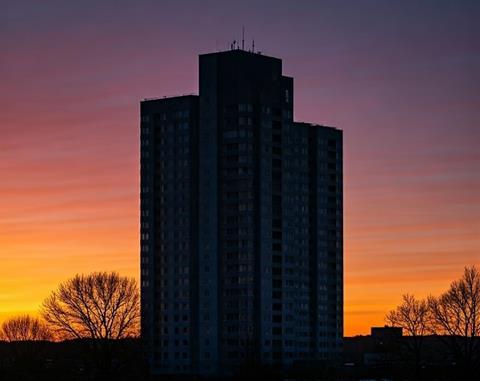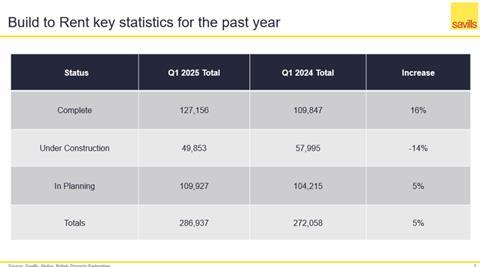The number of BTR homes under construction falls 14% as completions outstrip starts
Build-to-rent project starts have lagged behind completions for the fifth successive month, prompting calls for urgent action to tackle building safety regulatory blockages.

The British Property Federation (BPF) has said its latest report with Savills will show a 14% decrease in the number of BTR homes under construction in the first quarter of this year compared to last year.
The paper shows London has seen the steepest fall, down 18% year-on-year to 15,000 homes under construction, while the regions dropped by 12% to 34,870. Completions have increased by 13% in London and 18% in the capital, but starts of new projects have slowed, reducing the amount of schemes under construction.
The BPF said the slowdown was due to “significant delays” at the Building Safety Regulator “blocking schemes”, while concerns over viability, costs and the economy are also leading to caution in the market.
Melanie Leech, chief executive at the BPF said: “Completions remain robust, and planning activity is holding up well, but the sector is facing a real bottleneck in progressing schemes through to construction.
“Viability challenges, coupled with continued uncertainty around project timelines are slowing momentum just at a time when rental demand is rising sharply. Investor appetite is there but unlocking it will require a concerted effort to support the delivery of BtR homes. Urgent action is needed in particular to deal with the pipeline blockage currently being caused by the BSR.”
Guy Whittaker, associate director at Savills, said: “There are significant challenges to future supply…particularly for schemes facing building safety delays. This represents a substantial threat to current housing delivery and puts government housing targets at risk.”
Concern has been mounting in the housing development sector in recent months about the impact of the Building Safety Act’s ‘Gateway 2’ check, which must be passed prior to construction starting on site.
>>See also: What the delays at the Building Safety Regulator mean for high-rise development
>>See also: How closely has the government adhered to the Grenfell Inquiry’s recommendations?
Student housing developer Unite In January said the issues were adding six months to the average length of build programmes.
Andrew Moore, head of operations, planning and building control at the BSR, in February said the organisation was deploying increasing resources to tackle delays, and that wait times for applicants for building control approval were falling. Moore said the main cause was that the outsourced delivery model for processing applications run by the BSR was not working as well as anticipated.
Moore said the regulator was putting in extra resources and forming hit squads to tackle identified problems. However, Moore added that the quality of applications also needed to improve, with developers often just asserting in application that regulations had been met and then attaching supporting documents, rather than explaining succinctly how their projects meet those regulations.
BSR has been approached for comment.











No comments yet